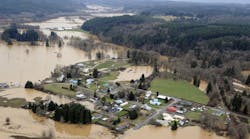Portsmouth, N.H., Outlines MS4 Storm Water Permit
Portsmouth city officials are outlining plans to comply with requirements associated with its “MS4” storm water management permit, which was issued in July 2018.
The permit comes with a list of requirements during its five-year lifespan, such as public education, finding illicit discharges, controlling construction erosion and more street sweeping.
Private property owners, who own 71% of Portsmouth land, will be urged to adopt best storm water management practices, reported the Portsmouth Herald.
Although there are no immediate plans to bill property owners for stormwater runoff from impervious surfaces, this could change in the future, reported the Portsmouth Herald.
The city’s current $450 fee for a storm water permit for new developments to connect to the city system is also currently under review.
The Department of Public Works created a separate storm water division to respond to the federal requirements. Costs are being tracked and capital needs will then be identified and presented to the City Council.
“The way we managed the stormwater program wasn’t adequate,” said Public Works Director Peter Rice in an informational hearing.
The permit requires two educational programs a year.
By July, the city must have a regulation requiring any new development over an acre to have storm water management, which includes treating runoff from all impervious surfaces.
The city will also be required to do more street sweeping to keep debris out of storm drains. In 2018, 322 tons of material was swept from city streets.
Five streams in the city are chlorine impaired and a plan will be developed to reduce the use of salt on roads and other impervious surfaces, according to the Portsmouth Herald. The city intends to train staff for more efficient salt use and have a salt-reduction program complete in the future.
The rest of the city is being mapped to determine which areas should be given a higher priority.


